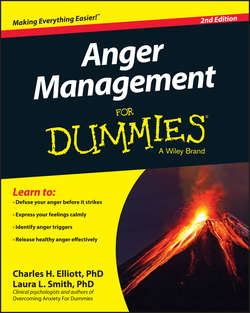Читать книгу Anger Management For Dummies - W. Doyle Gentry - Страница 8
На сайте Литреса книга снята с продажи.
Part I
Getting Started with Anger Management
Chapter 1
Understanding Anger
Understanding the Role of Emotions in Your Life
ОглавлениеEmotion can be thought of as a compound word. The e stands for “energy” and the motion means exactly what it says – “movement.” Emotions move you to act in ways that defend you from threat, lead to social attachments and procreation, cause you to engage in pleasurable pursuits, encourage you to reattach after some type of meaningful loss, and push you to explore your environment. Without emotion, life would stand still.
Emotions are, by their very nature, meant to be brief, transient experiences. Typically, they come and go throughout the day – moving you in various directions, as evidenced by changes in your behavior. Not acting on an emotion like anger is unnatural and, in some instances, can be unhealthy. Emotions reflect changes in physiology – elevations in blood pressure, heart rate, blood sugar, and muscle tension – that are usually harmless because they’re short-lived (that is, if you express them in a reasonable way). Emotions that aren’t expressed remain trapped within your body, causing a sustained state of physiological tension – and that can be deadly.
Suggesting that anger is either expressed or unexpressed is actually untrue. All anger is expressed – the question is how. You probably think that you’re expressing your anger when you do so in a way that other people can see, hear, or feel. Otherwise, you figure, you’re not expressing it. But the reality is that all anger is expressed – some of it in ways that aren’t observable right away. For example, you may not look or sound angry, but your anger may be expressing itself in your cardiovascular system (through high blood pressure or migraine headaches), your gastrointestinal system (through irritable bowel syndrome [IBS] or a spastic colon), or your musculoskeletal system (through TMJ or tension headaches).
Or anger may express itself in negative attitudes – pessimism, cynicism, hopelessness, bitterness, and stubbornness – or some form of avoidance behavior (giving people the silent treatment), oppositional behavior (“I don’t think so!”), or passive-aggressive behavior (“I’m sorry – did you want something?”). Anger may also sour your mood and leave you feeling down or depressed. You suddenly lose the enthusiasm you had previously.
Dr. Paul Ekman developed a list of seven primary emotions seen in all cultures around the world. Table 1-1 lists these emotions and some of the ways they express themselves.
Table 1-1 The Seven Primary Emotions
Alexithymics – People without feelings
Alexithymia is a word used to describe people who appear to lack emotions – including anger. Alexithymia is thought to be a fairly stable personality trait but isn’t a formal, psychological diagnosis in and of itself. Alexithymics tend to
✔ Have difficulty identifying different types of feelings
✔ Appear stiff and wooden in relating to others
✔ Lack emotional awareness
✔ Lack enjoyment
✔ Have trouble distinguishing between emotions and bodily feelings
✔ Appear overly logical when it comes to decision making
✔ Lack sympathy for others
✔ Appear perplexed by other people’s emotions
✔ Be unmoved by art, literature, and music
✔ Have few, if any, emotional memories (for example, memories of childhood)
We don’t suggest disconnecting from your feelings to manage your anger. You want to have emotions but you want to be in control of those emotions. You want to let anger move you to write a letter to the editor in your local newspaper about some social injustice. You want your anger to move you to stand up for yourself when your talents are being exploited in the workplace.
Anger that says to your spouse, “Hey, something is not working here” is good for a marriage. But if your anger only moves you to hurt others – or yourself – then you definitely have a problem. Think of anger as a tool that can help you throughout life if you know how to use it – and think of Anger Management For Dummies as a reference on how to use that tool.
